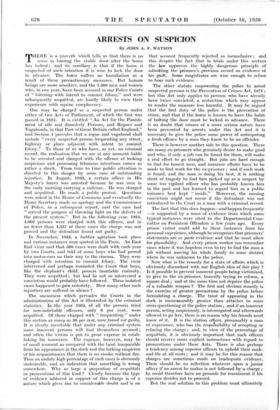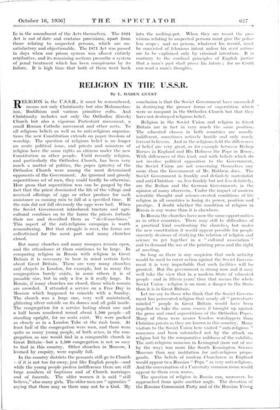ARRESTS ON SUSPICION
By JOHN A. F. WATSON THERE is a proverb which tells us that there is no sense in barring the stable door after the horse has bolted ; and its corollary is that if the horse is suspected of such intention it is wise to lock the door in advance. The horse suffers no humiliation as a result of these precautionary measures. But human beings are more sensitive, and the 1,800 men and women who, in one year, have been accused in our Police Courts of " loitering with intend to commit felony," and were subsequently acquitted, are hardly likely to view their experience with equine complacency.
One may be charged as a suspected person under either of two Acts of Parliament, of which the first was passed in 1824. It is entitled "An Act for the Punish- ment of idle and disorderly Persons, and Rogues and Vagabonds, in that Part of Great Britain called England," and Section 4 provides that a rogue and vagabond shall include "every suspected person frequenting any street, highway or place adjacent with intent to commit felony." To those of us who have, as yet, no criminal record, the realisation that we are at any moment liable to be arrested and charged with the offence of looking suspicious and possessing felonious intentions comes as rather a shock. From time to time public attention is directed to this danger by some case of outstanding injustice. In August, 1933, a certain officer in His Majesty's forces was arrested because he was seen in the early morning carrying a suitcase. He was charged and acquitted. He made a public protest. Questions were asked in the House of Commons and eventually the Home Secretary made an apology and the Commissioner of Police, in a subsequent report, said the case had "served the purpose of throwing light on the defects of the present system." But in the following year, 1934, 4,002 persons were charged with this offence, and in no fewer than 1,327 of these cases the charge was not proved and the defendant found not guilty.
In November, 1935. a further agitation took place and various instances were quoted in the Press. An East End vicar said that 500 cases were dealt with each year by two Courts, and told of some boys who had peered into motor-cars on their way to the cinema. They were charged with intention to commit felony. The vicar intervened and perhaps reminded the Court that boys, like the elephant's child, possess insatiable curiosity. They were acquitted ;• but had he not so intervened a conviction would probably have followed. These isolated cases happened to gain notoriety. How many other such injustices are suffered in silence ?
The uneasiness which pervades the Courts in the administration of this Act is illustrated by the criminal statistics. In the year 1934, of all the persons tried for non-indictable offences, only 6 per cent, were acquitted. Of those charged with " frequenting " under this section as many as 30 per cent. were found not guilty. It is clearly inevitable that under any criminal system some innocent persons will find themselves accused ; and often the victim is put to great expense in estab- lishing his innocence. The expense, however, may be of small moment as compared with the taint inseparable from his appearance in the dock and the lurking suspicion of his acquaintances that there is no smoke without fire. Thus an unduly high percentage of such cases is obviously undesirable, and an indication that something is wrong somewhere. Why so large a proportion of acquittals in prosecutions of this kind ? Clearly because the type of evidence adduced in support of this charge is of a nature which gives rise to considerable doubt and is on that account frequently rejected as inconclusive ; and this despite the fact that in trials under this section the law approves the highly dangerous principle of admitting the prisoner's previous record as evidence of his guilt. Some magistrates are wise enough to refuse to hear such evidence.
The other statute empowering the police to arrest suspected persons is the Prevention of Crimes Act, 1871; but this Act only applies to persons who have already been twice convicted, a restriction which may appear, to render the measure less harmful. It may be argued' that the first duty of the police is the prevention of crime, and that if the horse is known to have the habit of bolting the door must be locked in advance. There is no doubt that crimes of a more serious nature have been prevented by arrests under this Act and it is necessary to give the police some power of anticipating a fresh offence by a man they know to be an offender.
There is however another side to this question. There are many ex-prisoners who genuinely desire to make good and who, if only a job can be found for them, will make a real effort to go straight. But jobs are hard enough to find for honest men, and immense efforts have to be made to find work for the ex-prisoner ; and if such work is found, and the man is doing his best, it is nothing short of tragedy to find him picked up as a suspect by some too vigilant officer who has probably known him in the past and has learned to regard him as a public nuisance best kept "inside." Moreover, the ensuing conviction might not occur if the defendant was not introduced to the Court as a man with a -criminal record.
The fact that this does happen—and happen frequently —is supported by a mass of evidence from which some typical instances were cited to the Departmental Com- mittee on Persistent Offenders a few years ago. Every prison visitor could add to these instances from his personal experience, although he recognises that prisoners' statements are as pane evidence and that he must allow for plausibility. And every prison worker can remember cases where it was hopeless even to try to find the man a job without moving his whole family to some district where he was unknown to the police.
Now what is the remedy for a state of affairs which is obviously discordant with our English idea of fair play ? Is it possible to prevent innocent people being victimised, to give to the ex-prisoner, honestly trying to reform, a square deal ; and at the same time not deprive the police of a valuable weapon ? The first and obvious remedy is the exercise of greater precautions by the police before formulating a charge. The taint of appearing in the dock is immeasurably greater than attaches to mere cross-questioning at the police station ; and if an innocent person, acting suspiciously, is interrogated and afterwards allowed to go free, there is no reason why his friends need know of it. It is the station officer, presumably a man of experience, who has the responsibility of accepting or refusing the charge ; and, in view of the percentage of acquittals, it is obviously important that such officers should receive more explicit instructions with regard to prosecutions under these Acts. There is also perhaps a tendency among superior officers to uphold their rank- and-file at all costs ; and it may be for this reason that charges are sometimes made on inadequate evidence. There should be no reflection whatever upon a junior officer if an arrest he makes is not followed by a charge ; . he could therefore have no grounds for resentment if his superior decides not to proceed.
But the real solution to this problem must ultimately lie in the amendment of the Acts themselves. The 1824 Act is out of date and contains provisions,: apart from those relating to suspected persons, which are un- satisfactory and objectionable. The 1871 Act was passed in days when our prison system was alinost entirely retributive, and its remaining sections prescribe a system of penal treatment which has been conspicuous by its failure. It is high time that both of them went back into the melting-pot. When they are recast the pro- visions.-relating to suspected persons must give the police less scope ; and no person, whatever his record, must be convicted of felonious intent unless his overt actions are to be explained only by criminal intention. It is contrary to the cardinal principles of English justice that a man's past shall prove his future ; for no Court can read a man's thoughts.





















































 Previous page
Previous page